Poetry
Poetry

THEY LIED TO YOU ABOUT THE EUNUCHS
This book project introduces the history of eunuchism through auto-theory, historiography, historical fiction and poetry, exploring this identity in the ancient world and what kind of echoes can be heard in the present day. By overlapping various histories, and drawing the line between eunuchs in antiquity and contemporary gender discourse, Odete makes a case for a history of gender that hasn’t yet been written, asking what is the relevance of eunuchs to the history of art? And what does the study of the eunuch expose about the current world?
Edited by Jan-Pieter ‘t Hart
Proofread by Callum Dean
Designed by Tjobo Kho & Vlad Omelianenko
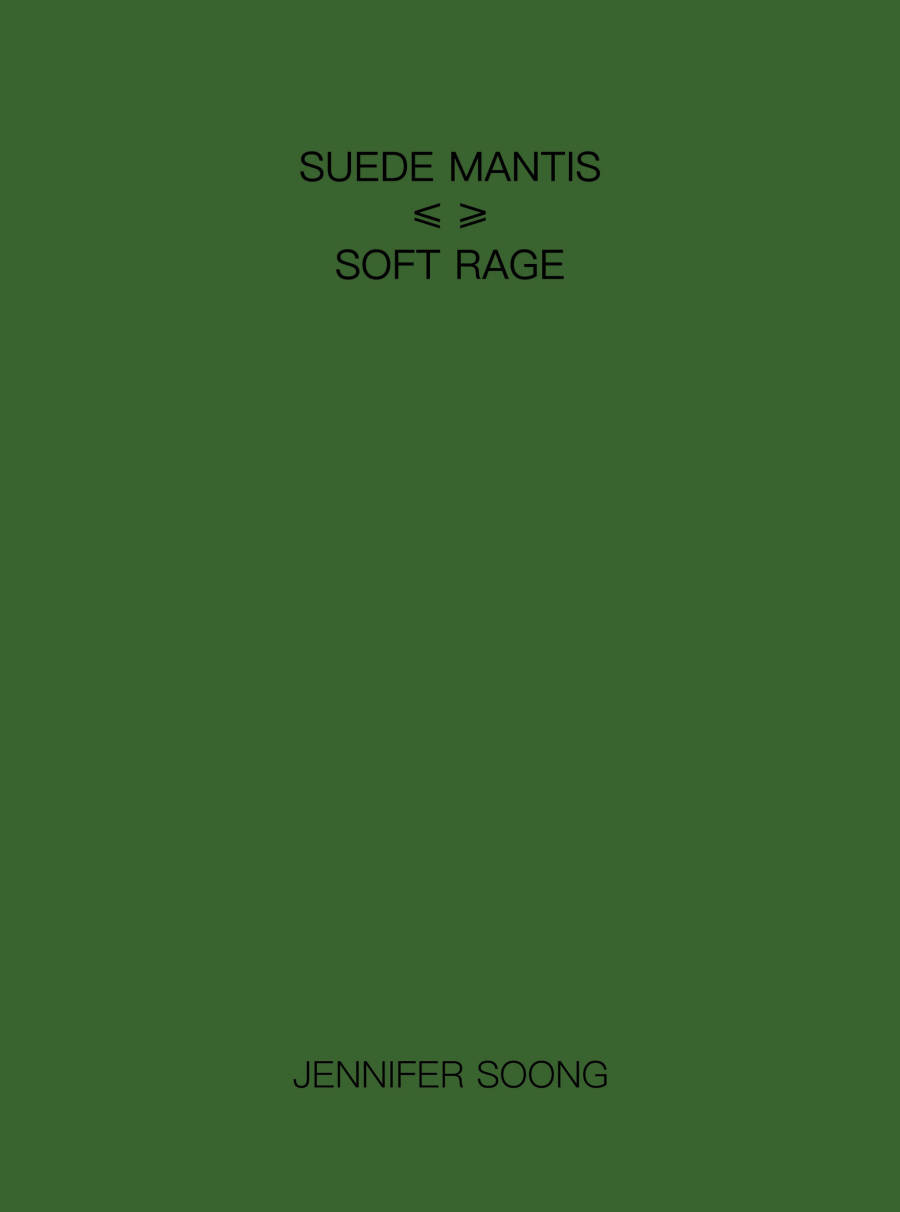
Suede Mantis / Soft Rage
Swaying between command and curiosity, acquiescence and destruction, distance and proximity, Jennifer Soong’s Suede Mantis / Soft Rage proffers tenderness that teeters on the precipice of loss. Premised on this peril is not a paralyzing grief but a generative poiesis of “cruel desperation,” in which poetry pronounces itself in contrasts and conditionals, had beens and renunciations. Like a tongue that tans flesh, like passion that’s made pliable by the pulsing and glistening of language, Suede Mantis / Soft Rage is the negotiated labor of a process rather than a product, raising interior operations to the surface while presenting an antithesis to mimetic construction. Neo-romantic and post-pastoral, the poems in Soong’s second collection reinvigorate lyric possibility.

Tripwire 15 - Narrative/Prose
Narrative/Prose issue, featuring a special section: I was writing, but it was drawing: a Renee Gladman mini-feature with work by Renee Gladman * Earl Jackson, Jr. * Bruna Mori * Alexis Almeida on Renee Gladman & Julie Carr * Lewis Freedman & Vanessa Thill on Renee Gladman & Mirtha Dermisache. as well as work by Isabel Waidner * sissi tax (translated by Joel Scott & Charlotte Theißen) * Susan Hefuna * Mira Mattar * Lital Khaikin * Maryam Madjidi (translated by Ruth Diver) * Omer Wasim & Saira Sheikh * Ilse Aichinger (translated by Christian Hawkey & Uljana Wolf) * Bronka Nowicka (translated by Katarzyna Szuster) * Maude Pilon (translated by Simon Brown) * Mehmet Dere * Syd Staiti * Jena Osman * Germán Sierra * Natani Notah * Julia Bloch on Bernadette Mayer * Robert Glück on Clarice Lispector * Rob Halpern on Bruce Boone & Dennis Cooper *Dylan Byron on/after Bruce Boone * Linda Bakke on Communal Presence: New Narrative Writing Today * Anna Fidler * Corey Zielinski on Bob Glück & Writers Who Love Too Much: New Narrative 1977-97 * Jackie Kirby on From Our Hearts to Yours: New Narrative as Contemporary Practice * David W. Pritchard on Kevin Killian * Dale Enggass on Simone White * Allison Cardon on Anne Boyer * Robert Balun on Leslie Kaplan * Marco Antonio Huerta on Omar Pimienta * Allison Grimaldi Donahue on Josué Guébo * Sara Florian on Lasana Sekou * Louis Bury on Allison Cobb * Hugo Gibson on Annie Ernaux.
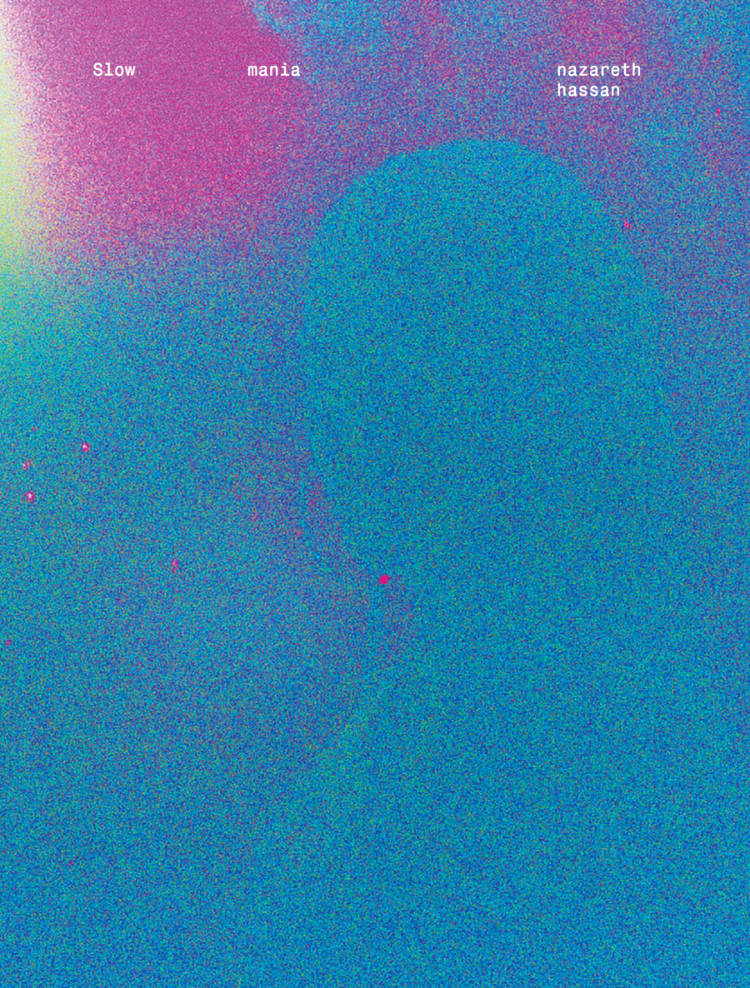
Slow Mania
Nazareth Hassan’s devastatingly brilliant Slow mania is a powerful document of senses and sense-making where estrangement and ugliness meets longing and beauty. The artist begins with a photographic sequence: two white-blue sky panels; a shattered glass storefront window; a street gutter clutching leaves, smashed straw sleeves and plastic lids; then snow holding a disassembled red stained chest of drawers. These are the writer’s plinths where form as waste is configured: “smoggy breath thru burnt-edged holes tracking acid mucous inside your home.” Slow mania provokes through enumerative structures, for instance, “screening bodies” who keep a sex club’s gates open only to some: “…197 mmm maybe lemme think / 151 yes / 162 yes / 197 ok yes, but keep your shirt on.” The poet deftly folds human intimacy into interspecies metaphor: “The rat torso twitches in agreement. Across / the street, the flies continue to starve,” where “…you’re lost in your own hole: what did you find?” Hassan attends to this painful search, bearing witness to the disturbingly exultant, offering a radical state of being, in and out of which the stunning and timely Slow mania lives and thrives. — Ronaldo V. Wilson
Slow mania is resistance to resolution, it’s pointillistic magic, it’s Seurat in Bed-Stuy: the tighter you zoom, the more undifferentiated beauty you encounter. It’s kinky (the kinked-up curls of somebody’s greased-up chops). It’s tender (bruised and brown, like the overripe fruit that haunts your summer kitchen waiting to be crumbled into a crumble). The colors are blurry, the edges are soft, the stakes are high, and everything—everything!—shimmers in the space between life and afterlife. Hassan’s gaze is a hot summer steam that sneaks into the skinniest, stinkiest crevices; the grimiest seams, the most miraculous cracks. Breathe into the abyss, that’s the invitation. Take it in, let it in. Be a wit(h)ness to every single being. — Steffani Jemison
This amazing book reads like a synesthetic performance, the only thing missing is the smell of sweat, of streets, of loss. A book of choreographed pages, scores, movements, image blur, hand-scribbles. The bleak, unsparing texts hidden among the materials turn out to be the record of sudden eruptions, violent street scenes, pick-up scenes, unclear dialogues, insults, self-debasing verbal injuries on repeat. The performers are racialized, sexualized, anonymized “persons,” “meats,” numbers, lovers, passers-by, all caught up in these dangerous yet desperately emotional and triggering dances at the limit. It will leave you raw, spaced-out, both roused and alarmed as though coming out of an intoxicating show, and wanting more. — Caroline Bergvall

A Map of Absence: An Anthology of Palestinian Writing on the Nakba
A Map of Absence presents the finest poetry and prose by Palestinian writers over the last seventy years. Featuring writers in the diaspora and those living under occupation, these striking entries pay testament to one of the most pivotal events in modern history – the 1948 Nakba.
This unique, landmark anthology includes translated excerpts of works by major authors such as Mahmoud Darwish, Ghassan Kanafani and Fadwa Tuqan alongside those of emerging writers, published here in English for the first time. Depicting the varied aspects of Palestinian life both before and after 1948, their writings highlight the ongoing resonances of the Nakba.
An intimate companion for all lovers of world literature, A Map of Absence reveals the depth and breadth of Palestinian writing.
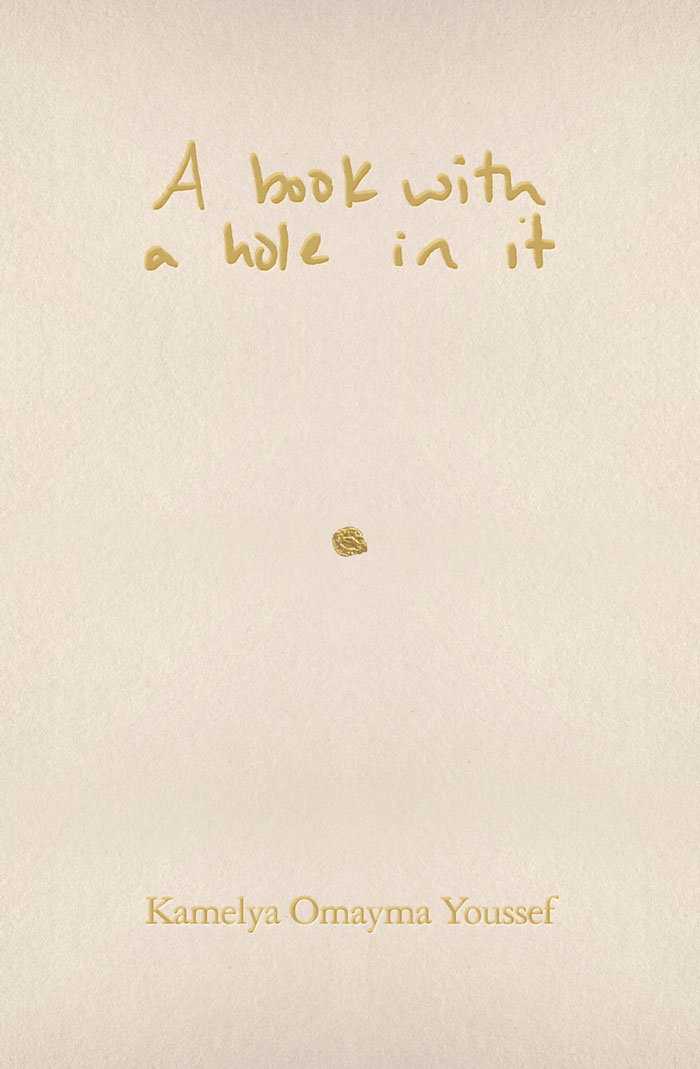
A book with a hole in it
Kamelya Omayma Youssef’s A book with a hole in it uses the poetry of the fragment and the language of everyday survival to gesture towards the fallibility of language at the juncture of the multiple, intersecting wars on women, on "terror," on the non-White body, and on people and language in diaspora. Drawn from a set of journals written over a four-month period, A book with a hole in it throws the formal, official work of poetry into relief, asking what knowledge exists beyond knowledge, which silences are too deep to be surfaced on the page, and how to pierce through trauma and violence to approach a politics of redemption.

Metamorphoses
Metamorphoses springs from Ovid's epic poem to explore the slipperiness of identity, its propensity for change and transience. In poems that shift registers from travelogue to elegy, from nature documentary to a simple record of the realities of daily life, Evan Kennedy focuses on transformation, personal and collective, in an empire in decline, in a world transfigured by ecological upheaval.
With a range of reference from Roman household Gods to San Francisco poetic titans to musical celebrities like Madonna and Bob Dylan, Metamorphoses confronts change as an inevitable molecular process.
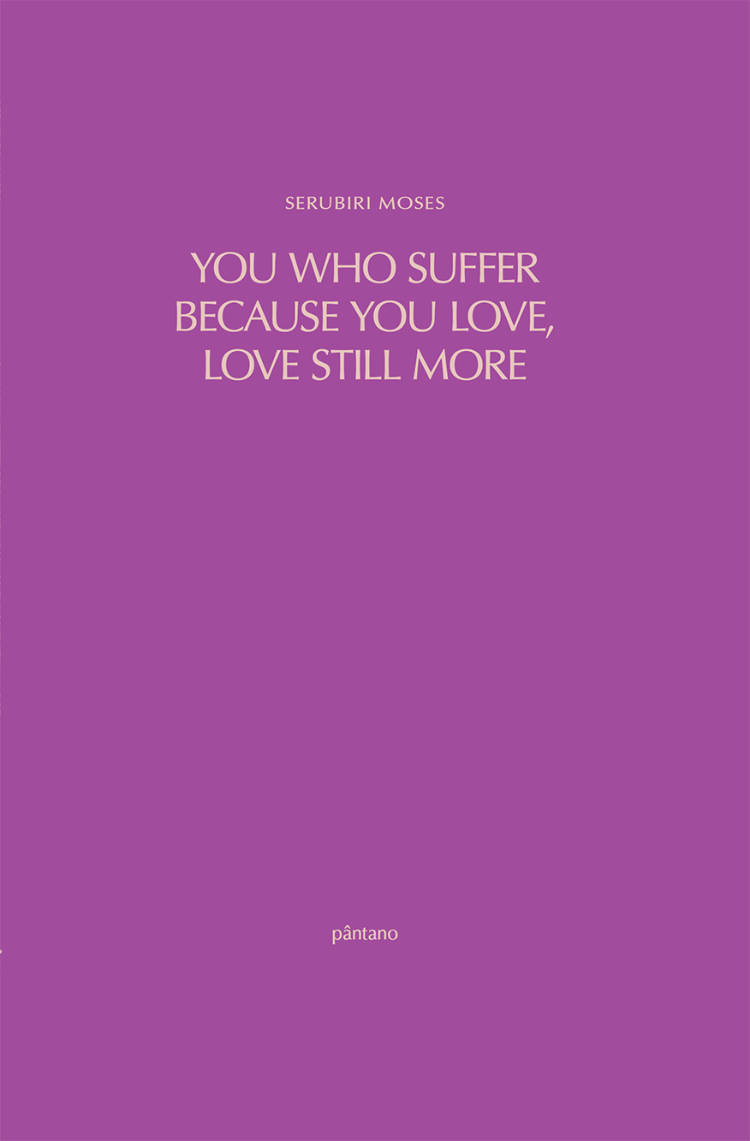
You Who Suffer, Because You Love, Love Still More
In You Who Suffer, Because You Love, Love Still More, Serubiri Moses offers an intimate and personal study of the lives and loves of pop star Freddy Mercury, combining a detailed epigraphy on the duplicitous nature of Mercury's origins, sexuality, and artistic talent with his own delicate memoir as a poet. Through this series of interlocked poems, yet again Moses lures us into an atmosphere both sensual and scholarly that echoes well past its last verse.
With ardor and grace, Serubiri Moses traverses a catalogue of pop music, visual art, and cultural history to bring his readers to a state of openness — to love, to art, and the freewill of ecstatic experience. Moses’s writing forefronts pleasure as a gateway for deeper critical inquiry, braiding personal memory and epigraphic excursions into sex, stardom, and poetry, reminding us in this journey that "pleasure almost happens without us knowing."
— Tausif Noor
Serubiri Moses, Ugandan curator and author, lives in New York City. He serves as a part-time faculty member at Hunter CUNY, and visiting faculty at the Center for Curatorial Studies, Bard College. He previously held faculty positions at New York University, and the New Centre for Research and Practice, and delivered lectures at Chazen Museum of Art, Art Institute of Chicago, Williams College, Yale University, University of Pittsburgh, The New School, Zeitz Museum of Contemporary Art Africa, and basis voor aktuelle kunst (NL), and University of the Arts Helsinki (FL). As a curator, he has organized exhibitions at museums including MoMA PS1, Long Island City; Kunst-Werke Institute for Contemporary Art, Berlin; the Hessel Museum, Bard College, NY; and the Smithsonian National Museum of African Art. He has curated solo presentations of Carl E. Hazlewood, Reza Aramesh, and is working on a retrospective of Taryn Simon. He previously held a research fellowship at the University of Bayreuth, and received his MA in Curatorial Studies at Bard College, and is an alumni of the Àsìkò International Art Programme. He serves on the editorial team of e-flux journal and his short stories have appeared in print in Ursula, and online in Lolwe. He has published poetry in the online journals Jalada and Badilisha Poetry Exchange, as well as in print journals Kwani? 7, Kwani? 8, and READ: A Journal of Inter-Translation (2022). He is the author of the poetry collection THE MOON IS READING US A BOOK (2023; Pântano Books).
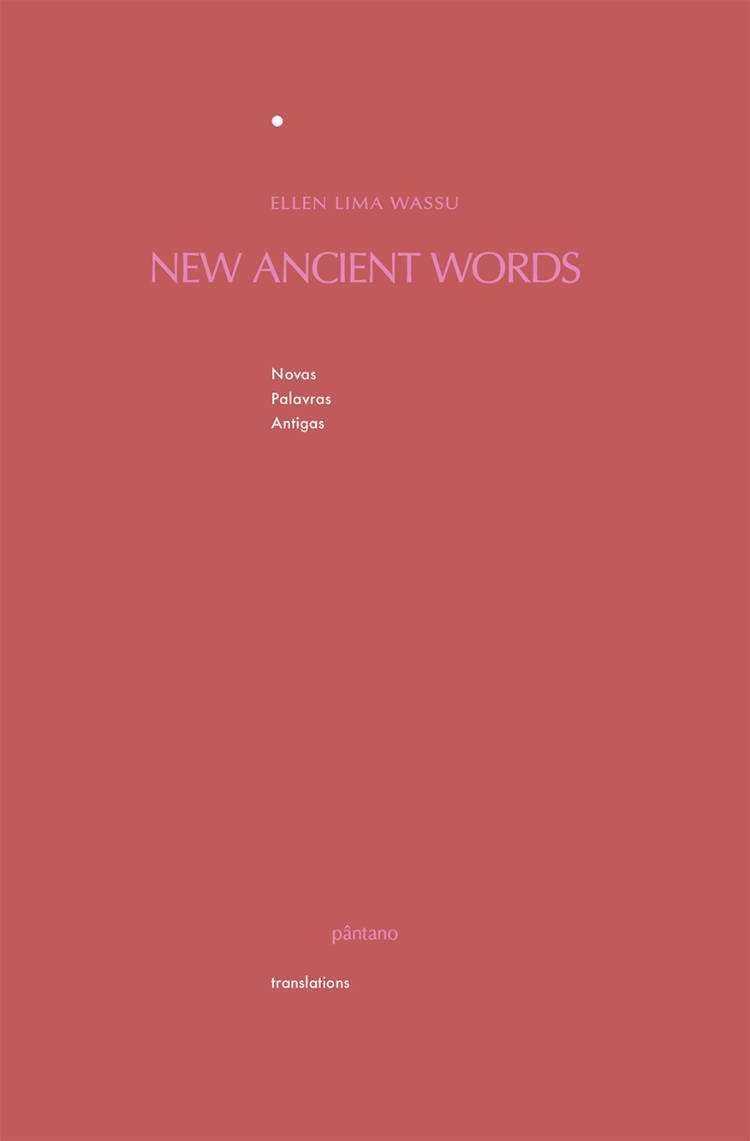
New Ancient Words
New Ancient Words is the first translation of Ellen Lima Wassu's poetry into English. A trilingual edition between her native Tupi indigenous language of the land of Pindorama, now Brazil, Portuguese, and English, this collection offers a wider readership her resistant yet intimate poetry, which flows seamlessly between her relational woes, a decolonial voice, and an animated playfulness with words and imagery. In her poems, history is an unstable landscape, where the personal, the mythical, and the natural are ever entwined and ever shifting in meaning.
Ellen Lima Wassu is a multiartist, freshwater fish, perplexed human, apartment gardener, and more beast than person. Born in Rio de Janeiro, she is Indigenous to the Wassu Cocal people (Alagoas, Brazil) and currently lives in Portugal, where she is pursuing a PhD, developing artistic practices, teaching courses, giving lectures, and working as an activist. In addition to contributing to literary magazines and anthologies, she has published ybykûatiara um livro de terra (Urutau, 2023) and ixé ygara voltando pra ’y’kûá (Urutau, 2021). Her practice weaves together art, poetry, performance, activism, critique, counter-colonial studies, essayistic writing, good encounters, river baths, listening sessions, and conversations with flowers.
Translation by Isadora Neves Marques and Alice dos Reis, revised by Marta Espiridião
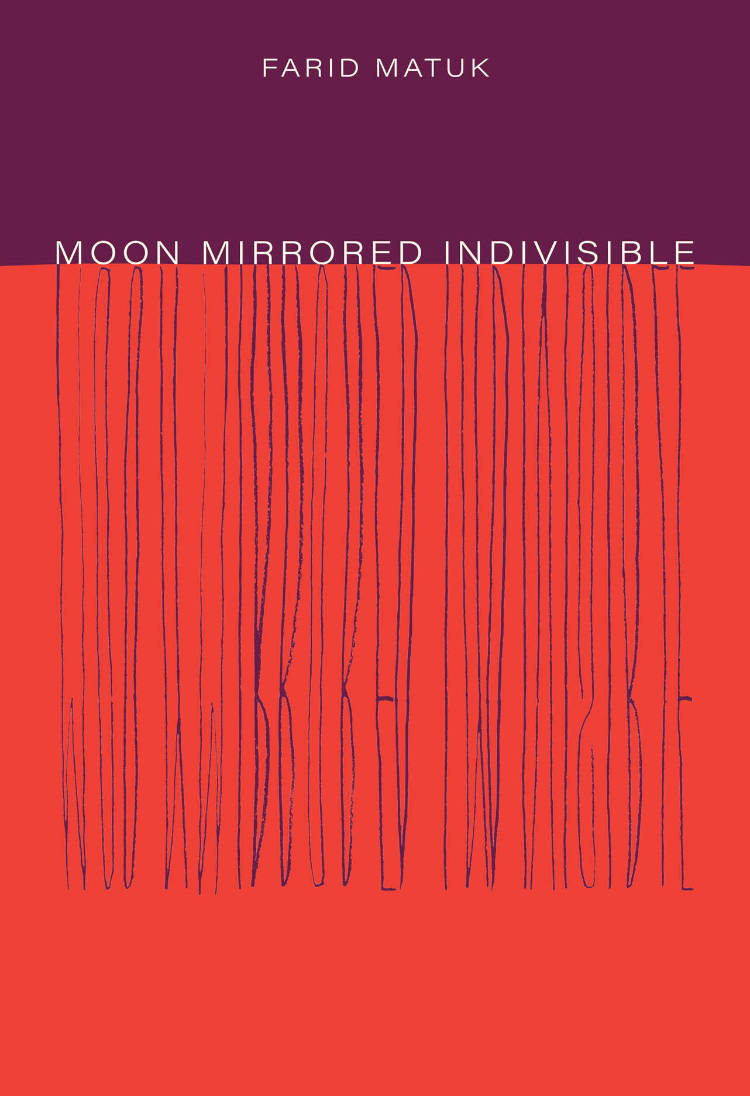
Moon Mirrored Indivisible
Multilayered lyric poems that resist systems of power and foster intimacy.
An inheritor of lineages marked by colonial and gendered violence, Farid Matuk approaches the musical capacities of verse not as mere excitation or decoration, but as forms that reclaim pleasure and presence. Entering the sonic constellations of Moon Mirrored Indivisible, the reader finds relief from nesting layers of containment that systems of power impose on our bodies and imaginations. In this hall of historical mirrors, fictions of identity are refracted, reflected, and multiplied into a vast field of possibilities. Matuk’s meditations on place and power offer experiments in self-understanding, moving through expansive conversations between a lyric “I” and others, including poets, the speaker’s partner, ancestors, and the reader, and creating spaces for strange intimacy. Each of the book’s four sections of poems builds on the other to ask how we might form a collective—a people—not founded in orthodoxies of originality but in the mutual work of mirroring one another.

Memory
A spiritual homage to Bernadette Mayer's monumental artwork of the same title, Dorothea Lasky's Memory is a cycle of "poet's essays" stirred by two profound questions. What constitutes personhood and consciousness? What memories get lost, and why?
Expansive in her quest for answers, Lasky launches an inspired investigation of the forces that form our lives and deepest senses of ourselves. She identifies three dimensions of memory—ancestral, personal, and poetic—and in her singularly clear voice, undertakes to enter into their mysteries. From those recesses, she returns with a wide-ranging collection of essays that like lyric poems find the universal inside the particular. Memory reflects on the banal; private emotions and historical trauma; dear departed poets (Diane di Prima, Lucie Brock-Broido); her father's battle with Alzheimer's; and cultural events that have become charged sites of collective reminiscence (the moon landing, the music of Neutral Milk Hotel). Other pieces face the flip side of memory, asking what's left where memory is absent, and what's "real" beyond the horizon of death. The book closes with "Time, the Rose, and the Moon," an ars poetica published here in English for the first time, which offers the ancient symbol of the Ouroboros as a figure for the nonlinear processes of time, memory, and art.
Like Mayer before her, Lasky reveals memory to be huge and haunting, as she accumulates impressions that challenge the very possibility of fixed meaning. "Every rose has the scent of death," she writes. "And poetry is a perfume. That will stay on your body forever.... Whatever happens this time around, remember that."
Dorothea Lasky is the author of six full-length collections of poetry, including, most recently, The Shining (2023). She is also the author of the prose book Animal (2019) and a forthcoming book about Sappho, as well as the editor of Essays (2023) and a coeditor of Open the Door: How to Excite Young People About Poetry (2013). Her writing has appeared in POETRY, The New Yorker, The Paris Review, The Atlantic, and Boston Review, among other places.
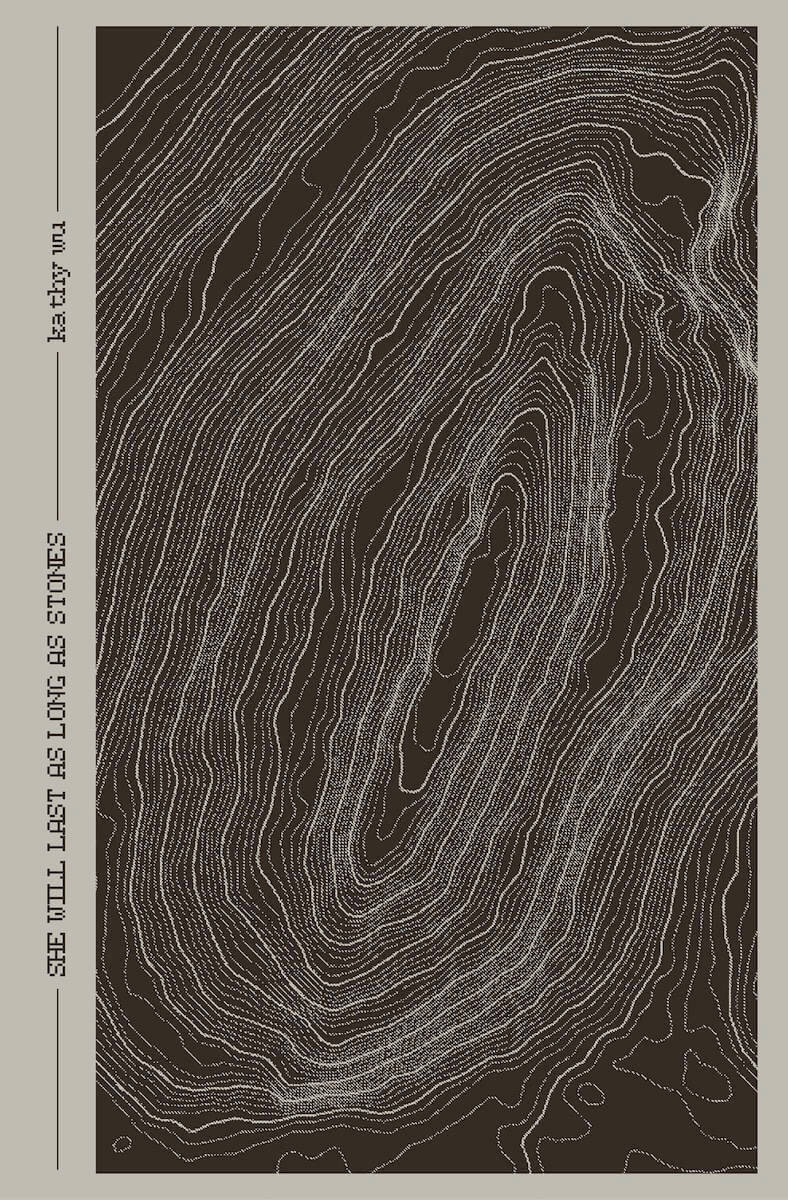
She Will Last as Long as Stones
Weaving together the matter of geology, migration, and computation, kathy wu’s debut book She Will Last as Long as Stones mines data from the United States Geological Survey, pairing it with (mis)translations of conversations with the author’s mother, narratives of racialized and gendered labor, and elegies on end-of-life care. Through text, photo-collage, and diagrammatic circuitry, wu mobilizes language toward the edges of things, where glitch and failure meet grief, outpour.
kathy wu's She Will Last as Long as Stones is the 2024 Open Reading Period Book Prize winner, and was selected by guest judge Bhanu Kapil.
kathy wu is a Chinese–American artist, poet, and designer living in Providence, Rhode Island, on Narragansett land. She works across digital media, fiber, book arts, and language to pull at histories of science and technology. Her work has appeared via The New School, Dialogist, Rain Taxi, NatBrut, and Tilted House, and has been anthologized by Fonograf Editions and Nightboat Books. She has been awarded fine arts residencies at Blue Mountain Center, Black Mountain College Museum, and Pao Arts Center. She currently teaches full-time at Rhode Island School of Design (RISD), and holds an MFA from Brown University’s Literary Arts program.
She Will Last as Long as Stones has the inter-genre brilliance of asking where materials originate, and following that question until writing becomes a kind of listening with stone, with metal, for magnetic reverberations, for the thinking at the back of the cave.
— Bhanu Kapil
There just might be currents coursing through landscape, language, software, and labor—presences that escape extraction and will not be denied. She Will Last as Long as Stones looks into the multiple temporalities and operations of many things: material place, mining, social and scientific documentation, computation, migrant women's work, and mother-daughter relations, constellating them into a poetics of wondrous design and resonant beauty.
— Kimberly Alidio
She Will Last as Long as Stones is a subtle circuit that conducts a charge but (paradoxically) remains open. wu's intricate parataxis offers readers fertile resistance, while simultaneously leading us to grounded revelations about the intertwined materialities of technology, language, and memory.
— Allison Parrish
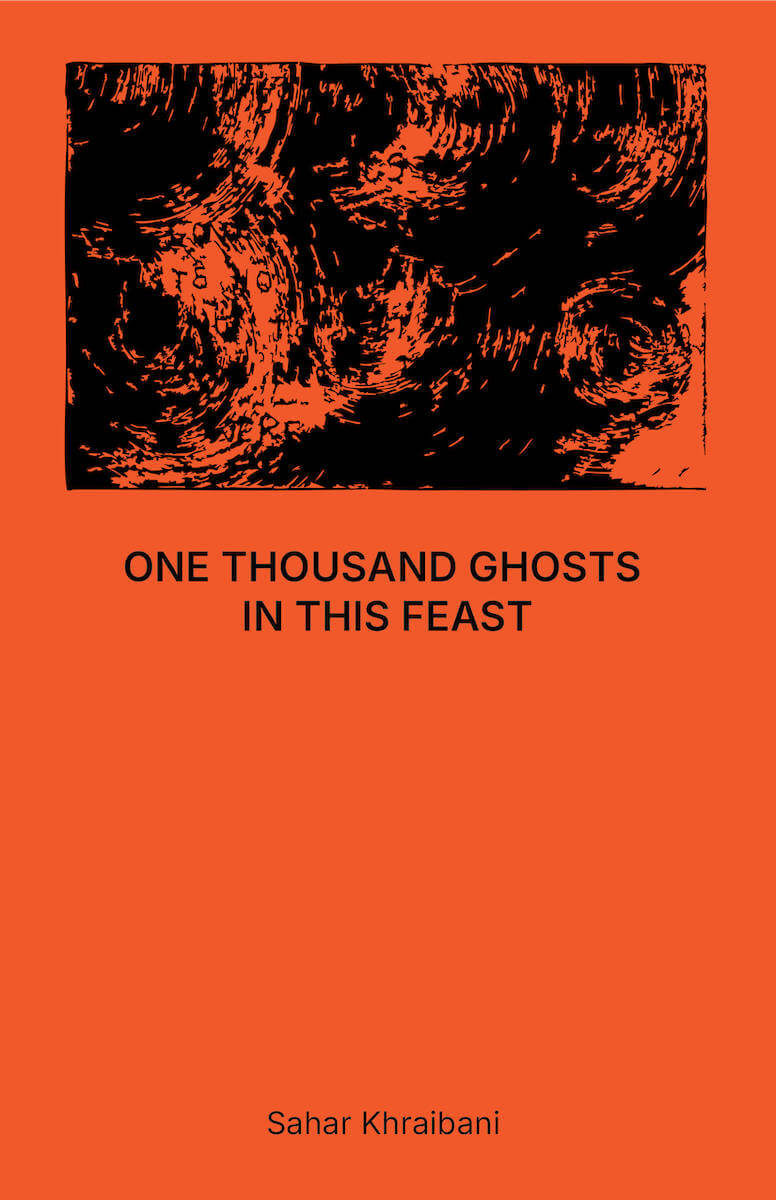
ONE THOUSAND GHOSTS IN THIS FEAST
Sahar Khraibani’s ONE THOUSAND GHOSTS IN THIS FEAST contends with desire, grief, and language as sites of injury and release. Written over a period of three days—amid ongoing genocide, land seizure, and displacement—the long poem counters logics of possession with those of relation. Khraibani’s all-caps, first-person address impels the poem forward, centering intertextuality as a force through which spectral presences shine.
Sahar Khraibani is a writer and artist whose work has been presented with Montez Press, The Brooklyn Rail, Magnum Foundation, the Poetry Foundation, the Poetry Project, and Hyperallergic among others. Sahar is a recipient of the Creative Capital / Arts Writers Grant, a fellowship at The Poetry Project, a MacDowell Fellowship, a 2024 residency at Mass MoCA, and is an alumni of the Whitney Independent Study Program. Sahar teaches at Pratt Institute and is the author of Anatomy of A Refusal (1080PRESS, 2025).
ONE THOUSAND GHOSTS IN THIS FEAST lays bare the “SENSELESS DECAY” potentiated by empire’s relentless categorization, containment, and calculated death delivery. Khraibani’s debut chapbook collapses the imposed and perceived distance written by borders, disrupts anticipated colonial language logics, and bursts “INTO THE MADNESS OF THE ORGY” with queer interference reverberating in all directions. From the soil, from the graveyard, from the dancefloor, from their favorite spot on the eroding waterfront, Sahar broadcasts, IN ALL CAPS, “THE UNNAMEABLE TRUTH.”
— Andrea Abi-Karam
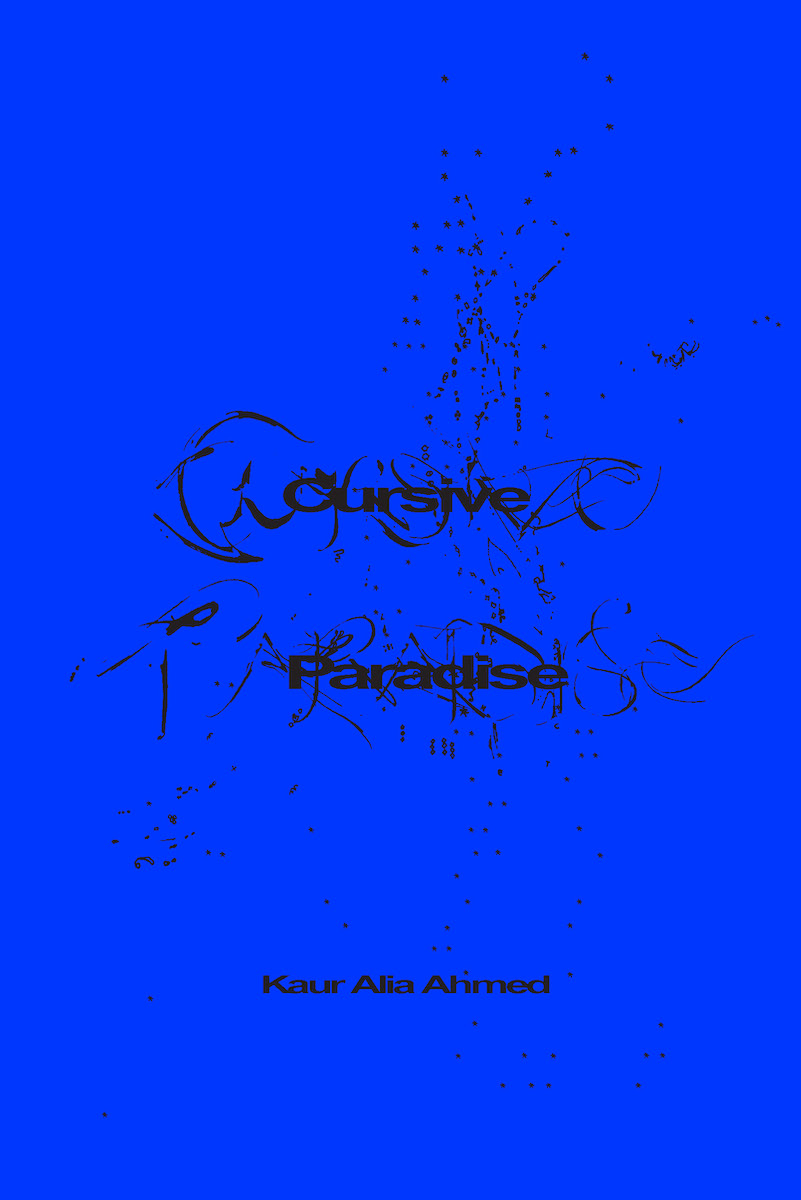
Cursive Paradise
Kaur Alia Ahmed’s Cursive Paradise asks how a refusal of cogency can lyrically expand perception. They write, “To weigh heavily on something / is to decide its shape,” and throw language into a state of excess. These poems shift and eddy, loop, and undulate, seeking out spaces of desire and onomatopoeic attraction. All the while, Ahmed offers a view of subjectivity and gender made resonant and malleable, insisting on language that is lush with what cannot be contained by the voice or the page.
Cursive Paradise is the recipient of the 2021 Carolyn Bush Award.
Kaur Alia Ahmed is an artist and writer living in New York. He is interested in destabilizing language, handling it in similar ways to ink, skin, light. His work has been presented at Interstate Projects, 77 Mulberry, Alyssa Davis Gallery, island gallery, Entrance Gallery, and The Drawing Center. His poems can be found in the Poetry Project Newsletter, Baest Journal, Spoil Magazine, BOMB Magazine, and Rhizome. Cursive Paradise is his first book.
Cursive Paradise forces us to rethink feeling, to enter a world where purple is sharp and where nectar leaves us spellbound. Kaur’s writing shapes a space where form and function give up their historical antinomy and renders the world in layers—of light, fluid, fetish, and fissure—breaking the lyric down to its guttural release.
— Bianca Rae Messinger
Kaur Alia Ahmed offers gleaming edges around the most beautifully staged immediate action. I read certain parts over and over, becoming more conscious of the physical dependence our bodies form in relation to words and music. These lines leap at the least provocation. Ahmed infuses the overall arrangement (visual, orchestral, narrative) with as much yearning as the language itself, leaving us a perfect, wavering space to land.
— Cedar Sigo
This is indeed a cursive paradise, but you’ll find no italics here. Emphasis happens differently, through repetition (if you catch Stein’s drift). Kaur Alia Ahmed’s poems, odes to momentum and transformation, refuse to settle into a single form. They propel readers forward and reward their desire to linger on their electric, libidinally charged utterances by having them recur, rearranged and slightly altered, again and again.
— Mónica de la Torre
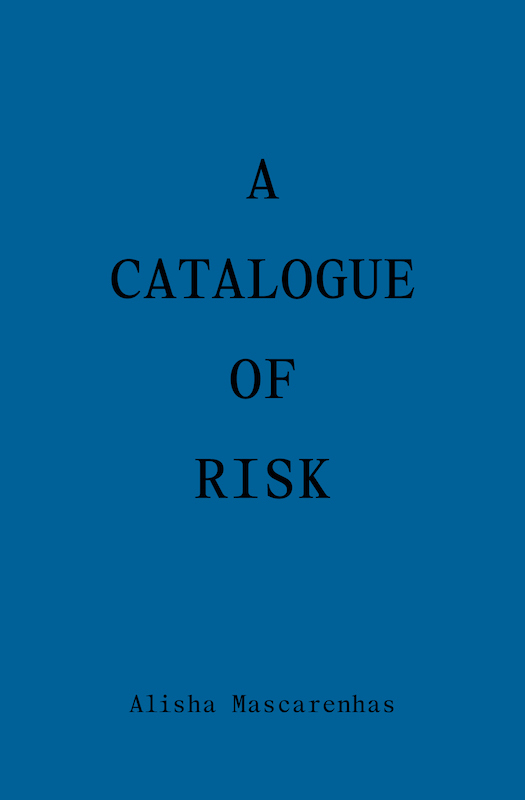
A Catalogue of Risk
Alisha Mascarenhas’s A Catalogue of Risk is a volte-face of the neoliberal market economy’s construction of isolated, individual safety. In her debut book of poems, Mascarenhas lingers in the question of risk as it arises in daily life and intimacy. Through a close study and partial translation of philosopher-psychoanalyst Anne Dufourmantelle’s Éloge du risque (2011), her poems posit risk as a fissure, through which we might imagine yet-unknown futures.
Alisha Mascarenhas’s A Catalogue of Risk is the recipient of the 2022 Carolyn Bush Award.
Alisha Mascarenhas (b. 1989) is a poet and translator and the author, most recently, of the chaplet Contagion Fields (Belladonna* 2021). She has contributed writing to Pamenar Press, The Poetry Project Newsletter, The Recluse, Peripheral Review, and The Felt, among others. Alisha was a 2023 resident at La Baldi Artist’s Residency in Montegiovi, Italy. She holds an MFA in Writing from Pratt Institute in Brooklyn, where she now lives.
There is a body lying across Alisha Mascarenhas’s A Catalogue of Risk. Here is a book of generosity and perdition, that could not anticipate the death of its author, the one these works are addressed to, written for, dreamt by, in a stream of proximities. A strange dismantling of time occurs as a result of quiet reversals in which light is diffracted across belated syntaxes, reaching past life to the living. Though A Catalogue of Risk is “running past the flowers,” it is a slow text that grieves the day’s illuminations. It is a lesson in transmission in which we, readers, are the apprentices of grace, at the edge also of drowning. Here is a book that has been “hungering to be emptied.” So, too, is it a book of promise.
— Nathanaël
A Catalogue of Risk is a book of luminous attention. Alisha Mascarenhas gives us the language of a mind tracking both internal and external weathers, tuning and returning herself to beauty, fear, grief and desire. Attending a cascade of emotions, the poet dwells in questions, knowing that to keep open to difficult questions is to keep open to desire. That she risks such openness, thinking always with others, through pain and love, is an astonishment.
— Madhu Kaza
A Catalogue of Risk poses an evocative challenge, one of prismatic nuance: to pursue multiple angles of intimacy along the life-death continuum of how risk holds, unfolds, and makes one whole. “The definition” of what risk is “is shaded in questions” and runs a gamut of desires and sensations at once libidinal and cerebral. Alisha Mascarenhas risks risk itself with this generous offering of exquisite phenomenology and experiential trace in the form of a full-saturation poetics glowing in amplitude and intensity.
— Brenda Iijima
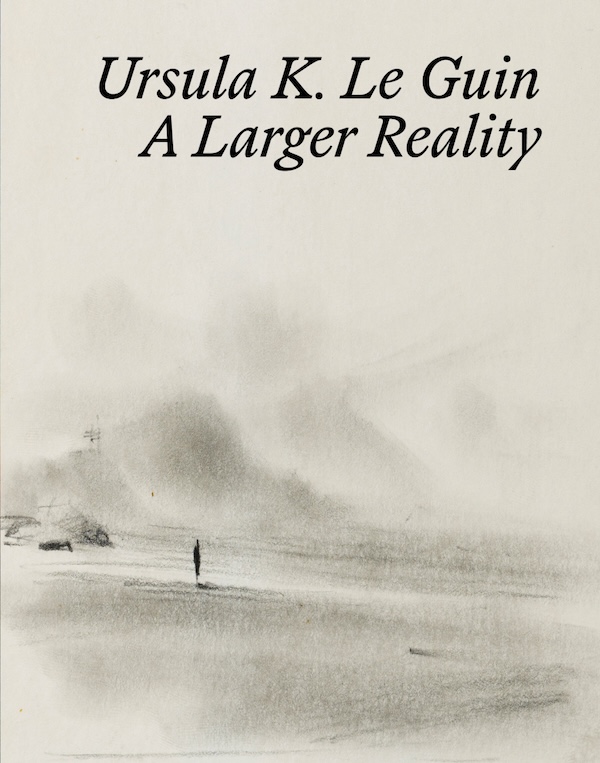
A Larger Reality
Ursula K. Le Guin, Conner Bouchard-Roberts
A beautiful compilation of poems, stories, essays, talks, and illustrations by Ursula K. Le Guin. Edited and designed by Conner Bouchard-Roberts.
With additional essays on Le Guin's thinking and craft by: adrienne maree brown, Isabelle Stengers, Moe Bowstern, Lola Milholland, Nisi Shawl, David Naimon, Mary Anne Mohanraj, Margaret Killjoy, Julie Phillips, and Harold Bloom.
This book serves as the companion publication to a gallery exhibition, of the same name, about Ursula’s life and work, showing at Oregon Contemporary Museum (from Nov 1st 2025 - Feb 8th 2026 in Portland, OR) curated by the Author’s son, Theo Downes-Le Guin.
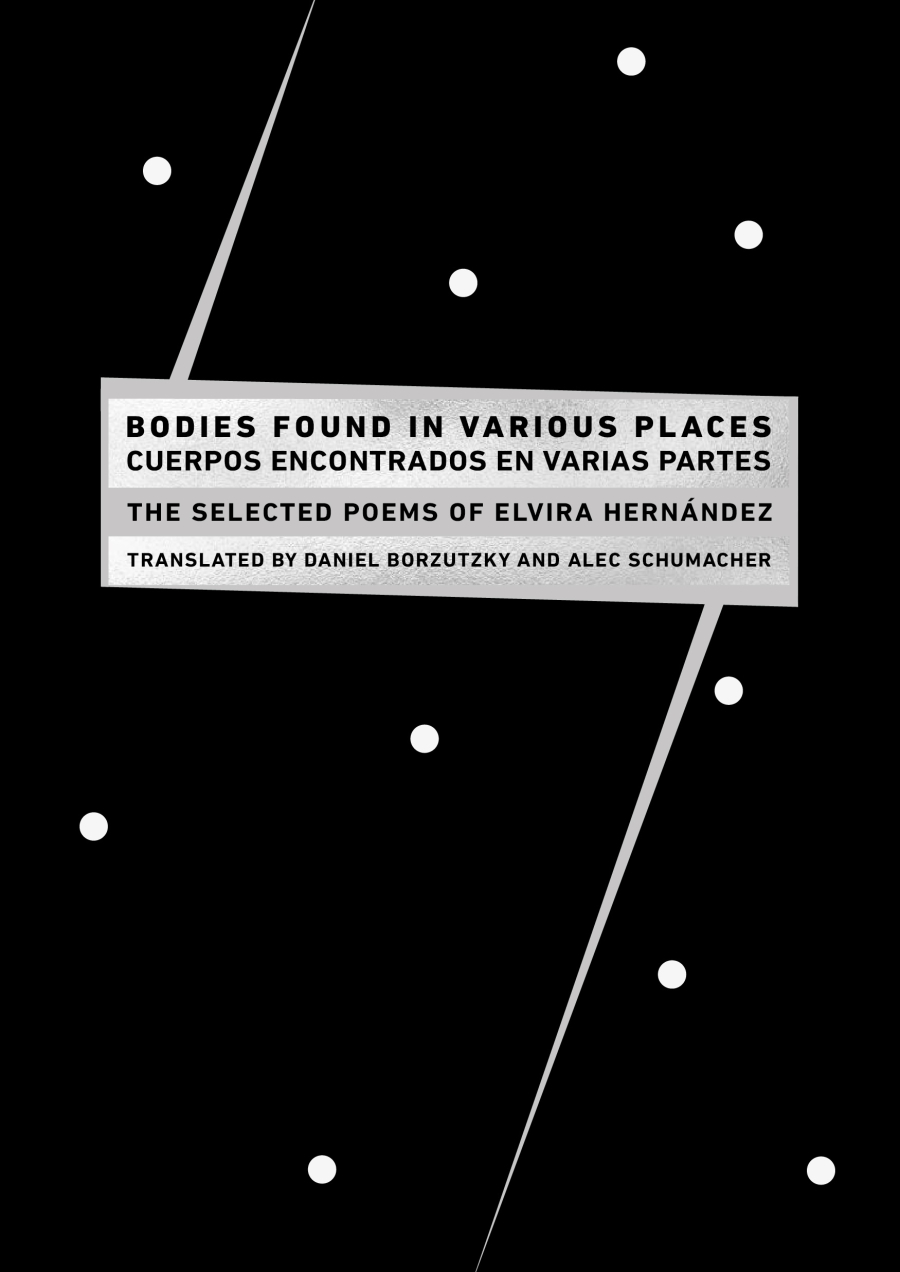
Bodies Found in Various Places
Elvira Hernández, Daniel Borzutzky and 1 more
The first anthology of Elvira Hernández’s poetry translated into English brings the award-winning contemporary Chilean poet's work of love, survival, persistence, disturbance, amazement, and delight to a new audience.
Elvira Hernández has occupied a marginal position in the Chilean poetic scene for decades, her quiet but mordant voice looking inward and outward, ironizing the circumstances of life that have brought us to this critical point in society. As recently as 2018, her work has become more visible after receiving the Jorge Teillier National Poetry Award (2018), the Pablo Neruda Ibero-American Poetry Award (2018), and the National Literature Prize (Chile 2024). With this belated recognition of her work has come an interest in studying her unique poetic language, with new critical books forthcoming from Spanish and Latin American publishers. Bodies Found in Various Places collects poems written from 1981-2016, providing readers with a curation of texts that show why Hernández is one of the most vital Latin American poets writing today.
"Elvira Hernández wrote her poem “The Chilean Flag” after she herself had been detained and tortured by the dictatorship for not complying with its lies. While Chileans were trained to look the other way, to go quiet by this terror, Elvira Hernández wrote a poem that could not be printed. Yet, the poem escaped like a prisoner and began circulating in Xeroxes, from hand to hand, until ten years later it was finally printed in Buenos Aires. In Elvira Hernández’s poetry, each line restores the right of words to speak. Each word becomes a healer, a prayer for a wounded, enslaved humanity forced to obey the rule of profit over life."— Cecilia Vicuña, author of Spit Temple

Tripwire 16 - Performance/Writing
A special issue focused on performance writing, with work by Tanya Lukin Linklater (with Michael Nardone), Jibade-Khalil Huffman & Simone White, Jean-Thomas Tremblay, Claudina Domingo (trans. Ryan Greene), Kim Rosenfield, Nathan Walker, Liz Knox, Rona Lorimer, Léo Richard, & Hector Uniacke, Mohamed A. Gawad & Dalia Neis, Mei-mei Berssenbrugge & Teddy Yoshikami, interviewed by Michelle N. Huang, Kyoo Lee and Jocelyn Saidenberg, Adriana Garriga-López, Gabrielle Civil, plus a Kevin Killian Tribute, with Eileen Myles * Scott Hewicker * Cliff Hengst * Karla Milosevich * Craig Goodman * Michelle Rollman * Anne McGuire * Wayne Smith * Tanya Hollis * Steve Orth * Lindsey Boldt * Maxe Crandall * Arnold J. Kemp * Carla Harryman, Lee Ann Brown & Tony Torn * Susan Gevirtz * Laynie Browne * Patrick Durgin * Norma Cole * Jo Giardini. & reviews: Jessica Lopez Lyman & Jocelyn E. Marshall on Gabrielle Civil, alex cruse on Merce Cunningham, Rob Stanton on Anne Boyer, Jack Chelgren on Miyó Vestrini, David Grundy on Stephen Jonas, Virginia Konchan on Sarah Vap.

Tripwire 19 - Sean Bonney Tribute Issue
Sean Bonney Tribute Issue
Don’t say “Rest in Peace,” say Fuck the Police: A Sean Bonney Tribute Portfolio, featuring: Katharina Ludwig, Lama El Khatib & Haytham El Wardany, Anahid Nersessian, Vicky Sparrow, Koshka Duff, Max Henninger, Joshua Clover, Jasper Bernes, D.S. Marriott, Fran Lock, Joey Frances, Mathilda Cullen, Nicholas Komodore, David Lau, Eve Richens, Sacha Kahir, Uwe Möllhusen & Marie Schubenz, Kashif Sharma-Patel, Linda Kemp, Daniel Eltringham & Fred Carter, Hugo García Manríquez, Jèssica Pujol Duran & Macarena Urzúa Opazo. With additional work by Belén Roca, translated by Noah Mazer, Adelaide Ivánova, translated by Chris Daniels, stevie redwood, Cait O’Kane, Mau Baiocco, Peter Bouscheljong, translated by Jonathan Styles. Zheng Xiaoqiong, translated by Zhou Xiaojing, Mayamor, translated by Eric Abalajon, Afrizal Malna, translated by Daniel Owen, Jorge Carlos Fonseca, translated by Shook, James Goodwin, Amalia Tenuta. Plus Engagements: Anne Boyer interviewed by Eduardo Rabassa, Gail Scott interviewed by Michael Nardone, Noah Ross on David Melnick, Guillermo Rebollo Gil on Pedro Pietri, Coco Fitterman on Ennio Moltedo, Sam Moore on Aaron Shurin, David Grundy on Lorenzo Thomas
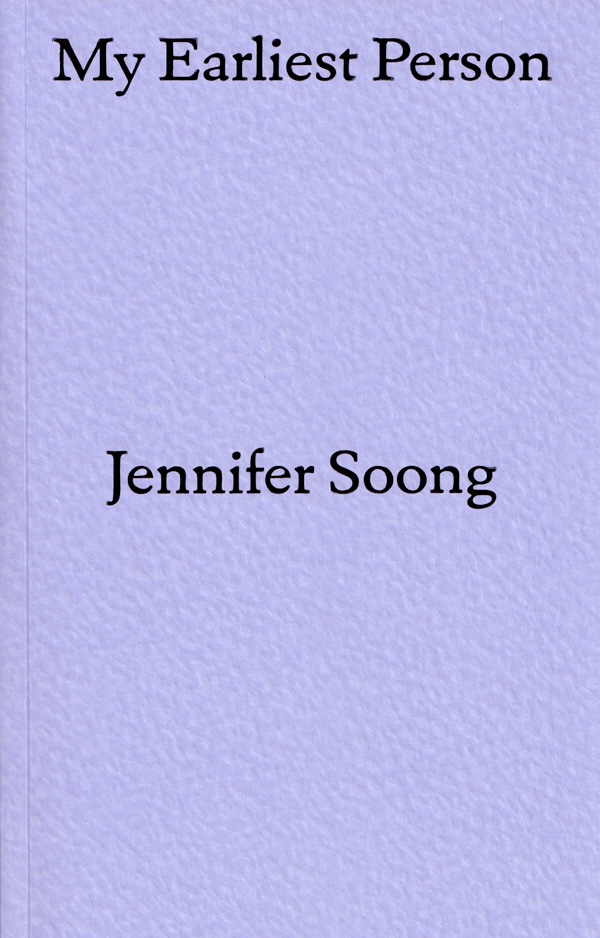
My Earliest Person
Lyrical drifts warped by syntax into blizzarding softness; odes to beauty, meaning, and inexperience splintered by history and grammar. An aqueous surface marbled with the lightest possible touch, lost footings arrested by change’s near-griplessness.
None of this matters. It’s only supposed
to save you from yourself. None of this
matters, when I try to take it out of me into
the world, which to find I can praise
I go out to
Composed across two winters between late 2022 and early 2024. Contains 43 poems.
“This luscious and needle sharp collection is a real feat of the textual imagination, wow.” —Adam Piette, Blackbox Manifold, no. 34
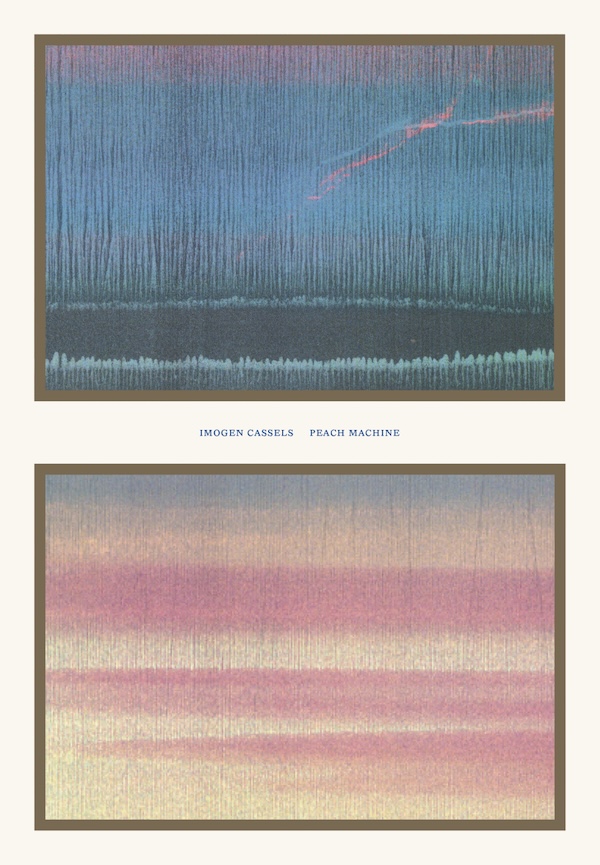
Peach machine
Peach machine comprises nine months of poems, tracing a recurrent cycle of sickness, heartbreak, reparation, and recovery from late summer back into early Spring. The work is roughshod: grieving, oxygen-starved, jetlagged, reflective, and relieved.
Designed and typeset by Phil Baber.
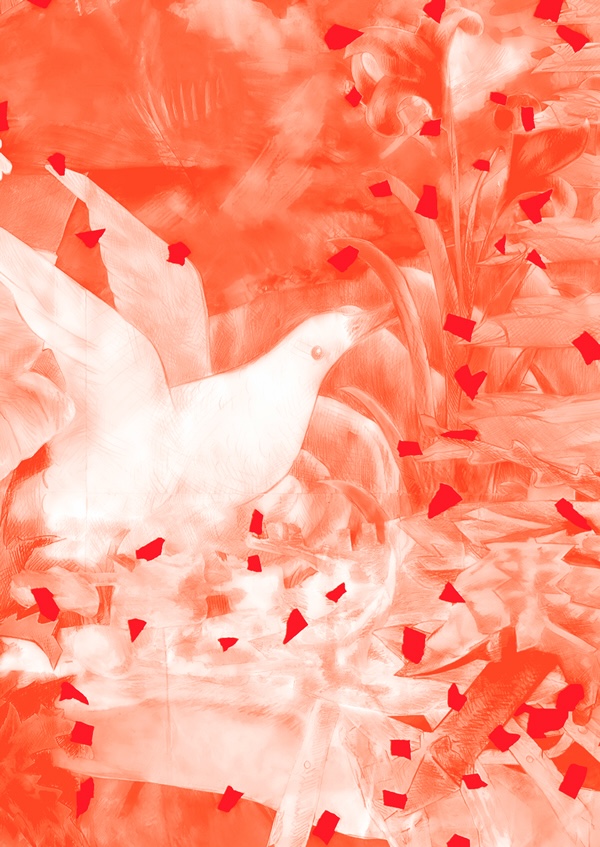
First Nettles
First Nettles collects poems written between 2021 and 2024, from precarious off-key lyrics to sprawling elegies of damaged life. A book of flailing, desperate music, hurt and hopeful, held together by pins and gaffer tape, art and courage and comradeship. Includes the sequence “Seizures” (2022) – “perfect in its openness and lyrical disfigurement” (Danny Hayward).
“[An] exhilarating collection […]. The sequences here are ferociously and admirably radical, with some superb political satire and verve to the poems.” —Adam Piette, Blackbox Manifold, no. 34
Designed and typeset by Phil Baber; cover collage by Sam Keogh
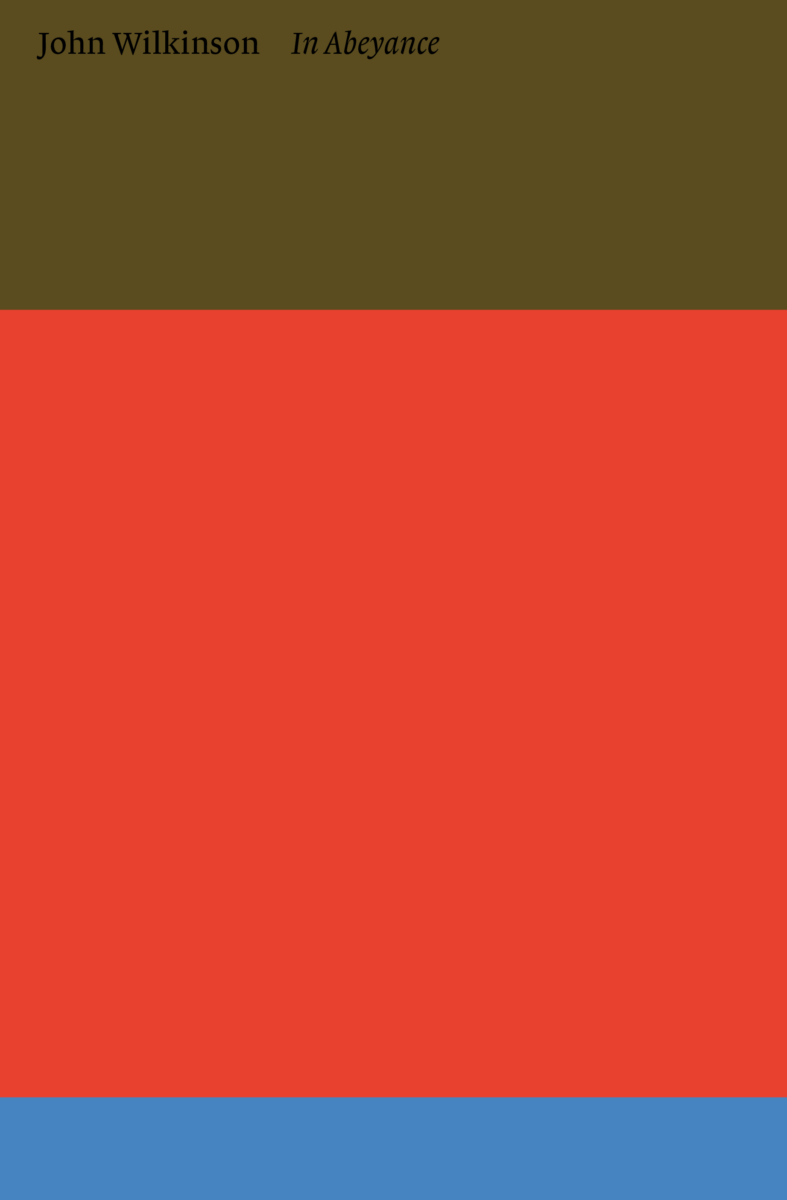
In Abeyance
With this new book of sedimented lyric, John Wilkinson’s poetry enters a terrain of creatures flattened in shale, in flat screen and in digital code. If Silicon Valley would repopulate Jurassic Park and defeat death, Wilkinson’s poetry would make actual what slides past in the disregarded day, whether the flattening of a city or the return of seasonal blossom. This poetry swells dry roots; it breaches the total coverage that flatlines the heart’s response, through its urgent and generous rhythms.
Designed and typeset by Phil Baber.
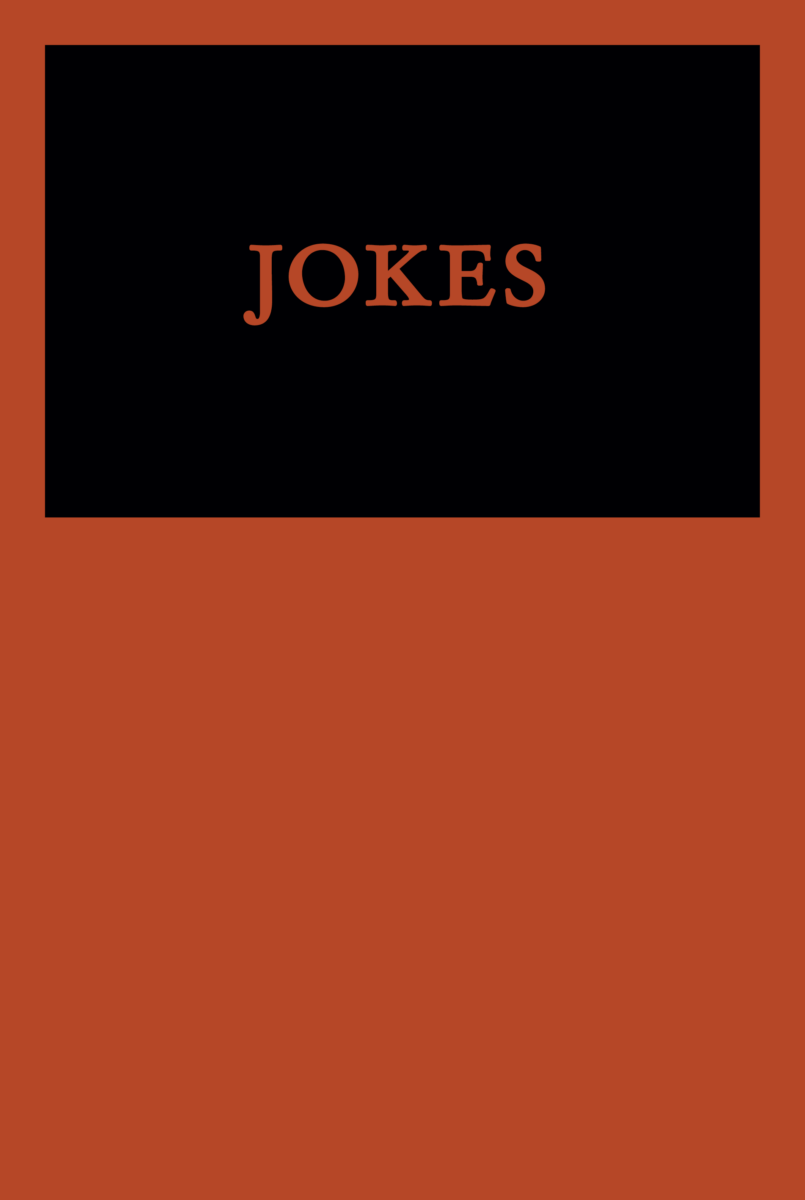
Jokes
Jokes is a crash course in psychic disintegration for the genocide generation. Ever wondered what a spoonbill thinks of peremptory norms? Or what a hippo can do with an egg-slice? What’s the secret of the success of men like David Papazian and Johnnie Moore, who get to run the Gaza Humanitarian Foundation, while poetry-reading demographics, from the higher and intermediate managerial and professional occupations down to the footwells of unskilled manual self-erasure, lie around standing up for themselves and fornicating with the void? An Author’s a Joke, to all manner of Folk, wherever he pops up his Head, his Head, wherever he pops up his Head, according to Fielding. But why? The 27 jokes of Jokes unfold over the course of a duration-block, in an exclusive interior, under new management, in the capable trotters, paws, hooves, claws, tentacles, jaws, beaks, and blowholes of a fabulous parliament of beasts, some drunk, some dead, some leery, some high, some tender, in the tradition of Boccaccio or Isaiah. They are all funny.
Designed and typeset by Phil Baber.